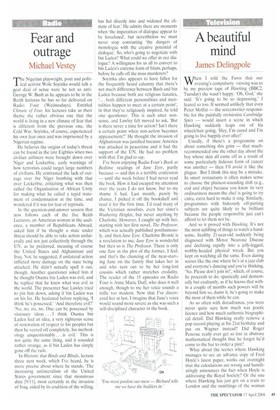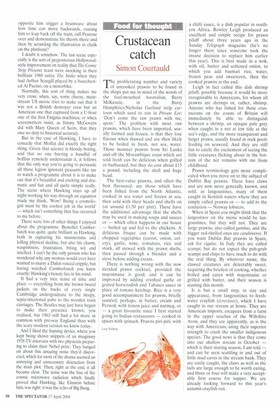A beautiful mind
James Delingpole
When I told the Fawn that our evening's compulsory viewing was to be my preview tape of Hawking (BBC2, Tuesday) she wasn't happy. 'Oh, God,' she said. 'It's going to be so depressing.' I feared so too. It seemed unlikely that even Peter Moffat — the screenwriter responsible for the painfully revisionist Cambridge Spies — would insert a scene in which Hawking suddenly leaps out of his wheelchair going, 'Hey, I'm cured and I'm going to live happily ever after!'
Usually, if there's a programme on about something this grim — that muchrecommended one the other day about the boy whose skin all came off as a result of some particularly hideous form of cancer was another — then I'll avoid it like the plague. But I think this may be a mistake. In smart restaurants it often makes sense to choose the plainest-sounding dish (e.g., cod and chips) because you know its very ordinariness means the chef is going to try extra, extra hard to make it sing. Similarly, programmes with hideously off-putting subjects are quite likely to be brilliant because the people responsible just can't afford to let them not be.
And so it proved with Hawking. It's not the most uplifting of things to watch a handsome. healthy 21-year-old suddenly being diagnosed with Motor Neurone Disease and declining rapidly into a jelly-legged, wobbly-headed physical wreck. But you kept on watching all the same. Even during scenes like the one where he's at a jazz club and everyone's dancing and you're thinking, `No. Please don't join in!', which, of course, he proceeds to do, spastically and dementedly but exultantly, as if he knows that within a couple of months such powers will be beyond him so, damn it, he's going to make the most of them while he can.
As so often with docudramas, you were never quite sure how much was poetic licence and how much authentic biographical detail. Did Hawking really remove a pop record playing at his 21st birthday and put on Wagner instead? Did Roger Penrose really ever get so lost in abstruse mathematical thought that he forgot he'd come to the bar to order a pint?
What about the scenes where Hawking manages to see an advance copy of Fred Hoyle's latest paper, works out overnight that the calculations are wrong and humiliatingly announces the fact when Hoyle is addressing the Royal Society? Or the one where Hawking has just got on a train to London and the ramblings of the woman opposite him trigger a brainwave about how time can move backwards, causing him to leap back off the train, call Penrose over and demonstrate his theory there and then by scrawling the illustration in chalk on the platform?
I doubt it somehow. The last scene especially is the sort of preposterous Hollywoodstyle improvement on reality that The Comic Strip Presents team were mocking in their brilliant 1988 satire The Strike when they had Arthur Scargill played by a barechested Al Pacino, on a motorbike.
Normally, this sort of thing makes me very cross: when, say, some cheesy, mainstream US movie tries to make out that it was not a British destroyer crew but an American one that captured from a U-boat one of the first Enigma machines; or when screenwriters insist, as Jimmy McGovern did with Mary Queen of Scots, that they owe no duty to historical accuracy.
But in the case of Hawking, I have to concede that Moffat did exactly the right thing. Given that science is bloody boring, and that no one barring a handful of boffins remotely understands it, it follows that the only way you're going to persuade all those legion ignorant peasants like me to watch a programme about it is to make out that it's beautiful and exciting and dramatic and fun and all quite simple really. The scene where Hawking stays up all night working his way through an equation made me think, 'Wow! Being a cosmologist must be the coolest job in the world' — which isn't something that has occurred to me before.
There were lots of other things I enjoyed about the programme. Benedict Cumberbatch was quite, quite brilliant as Hawking, both in capturing his mannerisms and lolling physical decline, but also his charm, waspishness, frustration, biting wit and intellect. I can't be the only person who has wondered why any woman would ever have wanted to marry a Dalek-voiced cripple, but having watched Cumberbatch you knew exactly: Hawking's beauty lies in his mind.
It had a very nice sense of time and place — everything from the brown tweed jackets on the backs of every single Cambridge undergraduate to the sleepy, sepia-interiored pubs to the wooden train carriages. The Beatles may just have begun to make their presence known, you realised, but 1963 still had a lot more in common with pre-war England than with the scary modern version we know today.
And I liked the framing device, where you kept being shown snippets of an imaginary 1978 TV interview with two physicists preparing to claim their Nobel prize. They banged on about this amazing noise they'd discovered, which for most of the drama seemed an annoying and unnecessary distraction from the main plot. Then, right at the end, it all became clear. The noise was the hiss of the cosmic microwave radiation which finally proved that Hawking, like Einstein before him, was right: it was the echo of Big Bang.



































































 Previous page
Previous page